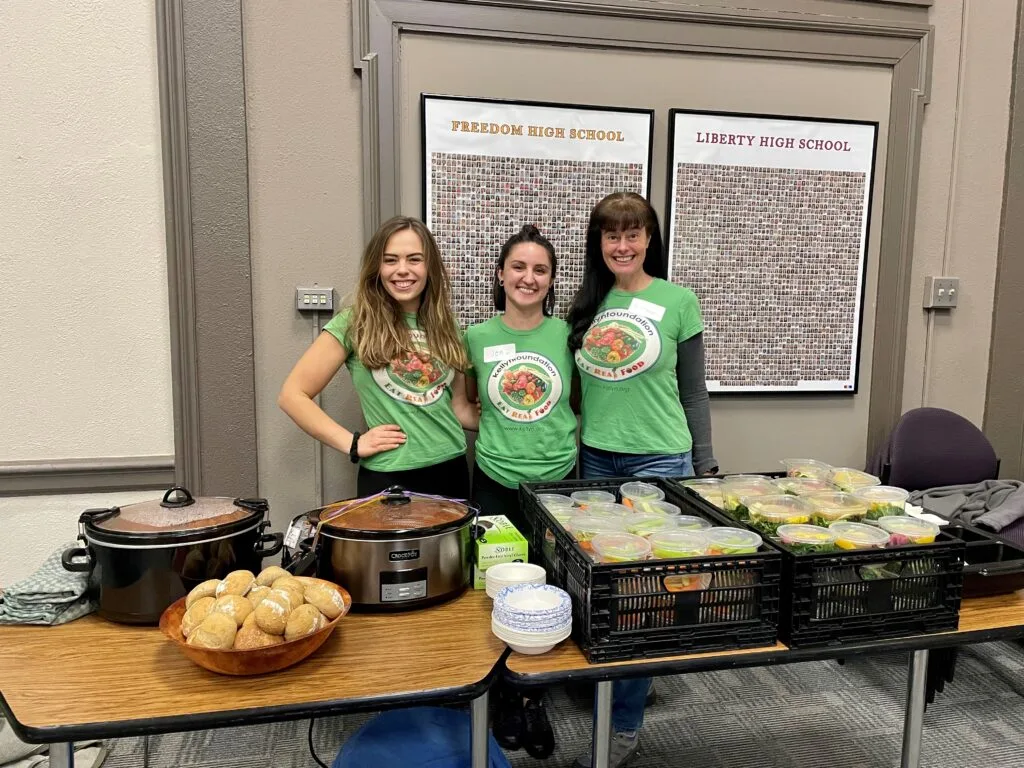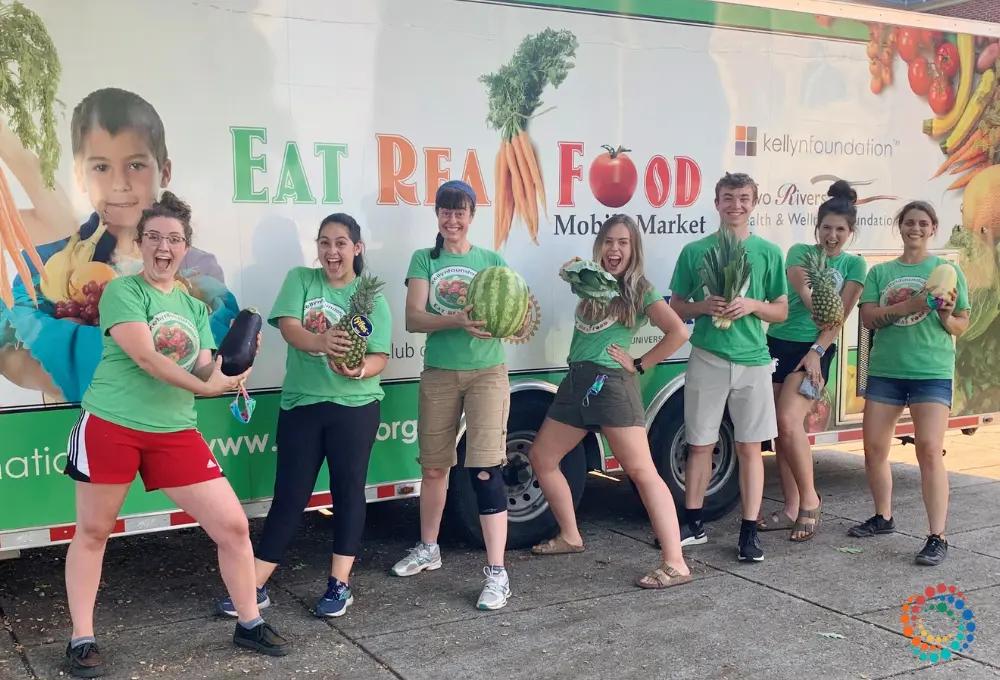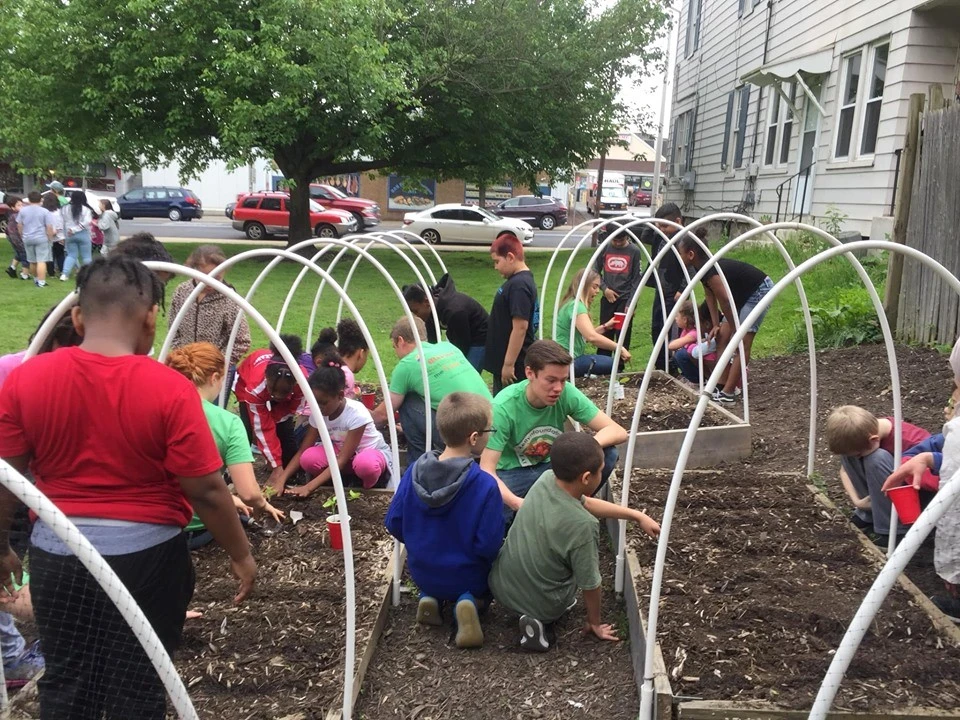Making the healthy choice the easy choice with lifestyle medicine
Dr. Meagan Grega co-founded an organization to transform the “choice architecture” in her Pennsylvania community so that unhealthy options are no longer the default lifestyle choice.
August 29, 2023

A leader in lifestyle medicine is at the forefront of an ambitious effort to make healthy choices the easy choices for families in eastern Pennsylvania’s Lehigh Valley.
Meagan Grega, MD, DipABLM, FACLM, co-founder and chief medical officer of the nonprofit Kellyn Foundation, spearheads a unique and collaborative healthy neighborhood immersion initiative to improve the short- and long-term health of the almost 700,000 people living in this one-time steel manufacturing hub north of Philadelphia.
The program utilizes schools and other community locations to pursue four areas of focus: access to healthy food, intensive lifestyle medicine interventions, school programming and teaching families to prepare delicious and healthy meals. Kellyn Foundation impacts more than 10,000 students in 36 elementary schools within nine school districts annually. Since 2016, it has operated the Eat Real Food Mobile Market, selling 136,000 pounds of nutrient-dense food during the past year in areas that lack access to healthy food options. The intensive lifestyle intervention program has documented success reducing HgbA1c levels of participants with prediabetes into the normal range over a three-month period.

Dr. Grega, who earned lifestyle medicine board certification in 2017 and is a faculty member implementing ACLM’s Lifestyle Medicine Residency Curriculum in the family medicine and internal medicine residency programs at St. Luke’s University Health Network-Anderson Campus, said the Kellyn program’s longevity and impact has attracted attention from other communities interested in replicating the model.
“Our big picture strategy is focusing on how we can shift the social norms of our community to healthier choices, and how can we shift the choice architecture so that healthy options are the default choice,” Dr. Grega said. “Making the healthy choice the easy choice is our mission for what we do in the Lehigh Valley.”
‘I wish I could do that too’
Dr. Grega has practiced family medicine for over 25 years and co-founded the Kellyn Foundation in 2007. In the early 2000s, she had noticed a great deal of obesity in both adult and pediatric patients.
“I knew the parents I treated already had diabetes, hypertension and heart disease; but I saw that their children were on track to develop the same diseases their parents had,” Dr. Grega said. “I saw increasing pediatric obesity and decreased cardiorespiratory fitness among kids who couldn’t run a lap around the gym without getting out of breath. I was providing lifestyle counseling during well checks but wasn’t making an impact. And there was nowhere to refer them that could support the children and their families in shifting to healthier lifestyle choices, especially in regard to physical activity, restorative sleep, stress management, decreased screen time and nutrient-dense food.”
She shared her frustration with a family friend and businessman, Eric Ruth, who suggested they cofound an organization that would impact the health of Lehigh Valley children and their families. She decided to change the trajectory of her career and try to build the type of programs that she wished she could refer her patients to.
“Some friends and family members said ‘You went to an Ivy League medical school, devoting all these years to medical training and building a practice and now you’re just going to stop?’” Dr. Grega said. “But when I told my colleagues in family medicine or cardiology or gastroenterology what I was planning to do, every one of them said ‘I wish I could do that, too.’”
Neighborhood immersion
The Kellyn Foundation initially offered an intensive lifestyle medicine intervention program for families. It included three months of structured group nutrition and physical activity classes, along with individualized lifestyle assessment and goal setting. It was largely successful in teaching new lifestyle habits. But once families completed the program, they almost always struggled to maintain those habits when they were no longer surrounded by a supportive environment.
Educating and supporting families in making healthy choices during the intensive intervention accomplished little if once the families returned to their regular routines and social interactions the conditions reverted to those most conducive to make unhealthy choices. That realization led to the creation of the Kellyn Foundation “Healthy Neighborhood Immersion Strategy,” which grew to include the following:
- Kellyn Food Access strives to ensure that neighborhoods have healthy whole food options that are convenient and affordable, including local produce and delicious, prepared lifestyle medicine meals. Consistent weekly visits by the Eat Real Food Mobile Market deliver fresh produce to community gathering spots and includes nutritional education, recipes and food samples.
- Kellyn Kitchens provides medically based, hands-on cooking classes at senior centers, schools and community centers, as well as for employers. The classes are designed to embrace individual food heritage and cultures while providing a deep understanding of the benefit of a plant-predominant eating pattern.
- Kellyn Schools educates elementary school children, their families and teachers on healthy foods and lifestyle choices. Participants learn how to grow food from seed and to train their taste buds to enjoy healthy food.
- Kellyn Lifestyle Medicine provides the education, tools, and support that allow families and individuals to reduce disease risk factors with a scientifically proven intervention through the adoption of better health habits and appropriate lifestyle modifications. The program serves community groups and self-insured employers, including healthcare systems, school districts and institutions of higher learning. Additionally, the program engages resident physicians and medical students from Lewis Katz School of Medicine Temple University, introducing them to the power of lifestyle medicine approaches.
Doctors often refer patients to the program. Testimonials collected by the Kellyn Foundation reflect the program’s popularity among the individuals who benefit.
“I lost 17 pounds, dropped two pant sizes, lowered cholesterol, decreased medication, slept better and lowered blood sugar to normal levels,” a participant in a therapeutic lifestyle change program said. “The Kellyn staff were informative, caring, and available, making the changes that I wanted to make easier.”
A customer at the Eat Real Food Mobile Market said “I have diabetes and I have a hard time getting things to prepare for me. With the fresh produce, I was able to add different things to my meals. All thanks to this program.”

Here to stay
The program is funded by a variety of sources, including foundation, government and community grants, individual donors and corporate sponsorships. More than 1,300 unique individuals utilized food-as-medicine prescription vouchers to purchase fruits and vegetables at the Eat Real Food Mobile Market during the past year. Kellyn Foundation hosts Lehigh Valley VegStock, an annual fundraising event with live music, healthy food vendors and artisans, family friendly activities and lifestyle medicine educational lectures.
“To pursue this path, you have to piece the funding together. I wish I could pay our wonderful staff more, because they are passionate advocates dedicated to helping our community to live long, healthy lives filled with vitality and purpose,” Dr. Grega said. “Funding is always a challenge. But once you are able to fully integrate into the fabric of the community and demonstrate that you are not only going to do this for a year or two and leave when the grant funding runs out, then people become more and more motivated to support the programs. They see the impact it has on the health of their community.”
It is hard but immensely satisfying work to assist people in accessing healthy food, learning new cooking skills and reversing their chronic diseases, she said. And other community efforts can make the same impact.
“We would love to help others launch similar initiatives by sharing the lessons we have learned,” Dr. Grega said. “In the end, the most important ingredients are relationships and a willingness to commit for the long haul while always being open to evolving your approach based on the partnerships available and the feedback of the community.”